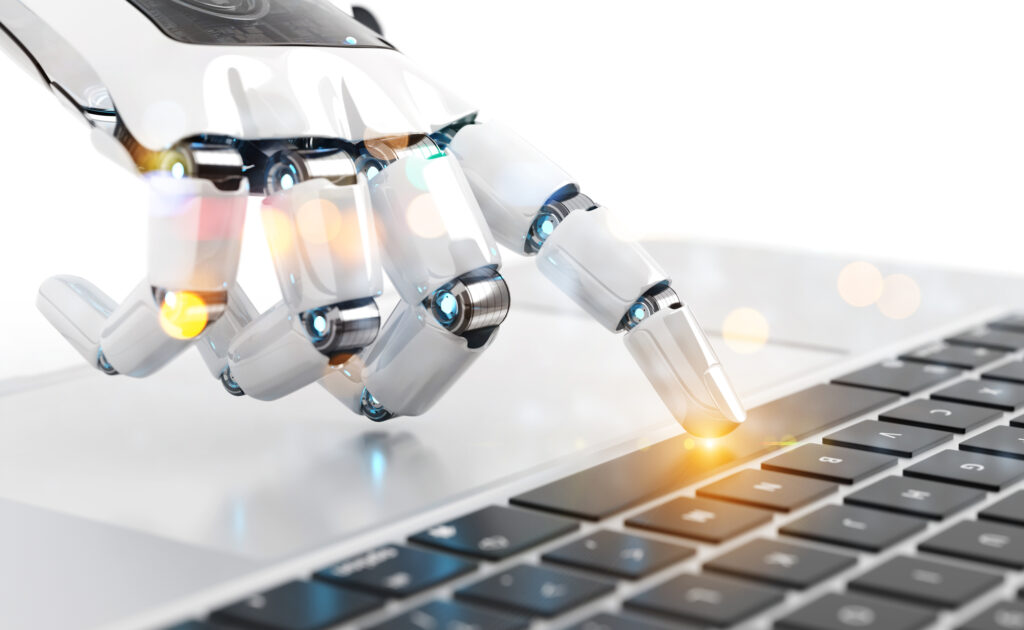Artificial Intelligence (AI) and Machine Learning (ML) are pushing the limits of what’s possible in sales and marketing. With the ongoing evolution of generative artificial intelligence (gen AI), open-source platforms are now being used in sales, and sales-tech companies are investing more money into gen AI innovations. These technologies are essential in today’s digitally-first world due to the increasing complexity and speed.
This will inevitability impact your business and how you interact with customers. It’s likely already happening. Leaders in the C-suite are re-evaluating how they can adapt to this new environment. We outline the opportunities and risks in this dynamic area and suggest ways to move forward.
According to our research, a fifth (or more) of the current functions performed by sales teams could be automated.

How AI is changing marketing and sales
AI will disrupt sales and marketing in all sectors. The result is a shift in consumer attitudes along with rapid technological changes.
Omnichannel is a must-have
Engagement models across industries are changing. Today’s customers expect everything, anywhere, at any time. Customers still want a mix of self-service, traditional and remote channels, including face-to-face sales, inside sales, and ecommerce. However, online ordering is on the rise.
Winning companies–those increasing their market share by at least 10 percent annually–tend to utilize advanced sales technology; build hybrid sales teams and capabilities; tailor strategies for third-party and company-owned marketplaces; achieve e-commerce excellence across the entire funnel; and deliver hyper-personalization (unique messages for individual decision-makers based on their needs, profile, behaviors, and interactions–both past and predictive).

What is generative AI (generative artificial intelligence)?
AI technology is evolving rapidly. The technology is getting easier to use and cheaper, but its complexity and speed are increasing at a rate that exceeds human capability. According to our research, a fifth (or more) of the current functions performed by sales teams could be automated. The rise of generative AI is also opening up new frontiers. In addition, venture capital investments in AI have grown 13-fold in the last 10 years. This has led to an explosion of data that is “usable”, i.e. can be used for formulating insights and suggesting tangible actions. The amount of data available for foundation model training is vast and increasing. Since 2012, the computing power has increased by a millionfold, doubling every three or four months.
Do you want to know more about our Growth Marketing and Sales Practice?
What does Gen AI mean for sales and marketing?
Customer experience (CX), productivity, and growth are all areas where AI and gen AI can have a positive impact on marketing and sales.
CX can, for example, offer hyper-personalized offers and content based on the individual’s behavior, persona, and purchase history. AI can accelerate growth by giving sales teams the analytics and insights they need to capture demand. AI can also boost sales performance and effectiveness by automating mundane sales tasks and offloading them, allowing salespeople to spend more quality time with their customers. Personalization is the key to all of these actions. AI, combined with context and company-specific data has allowed B2C to personalize their marketing and sales. Winning B2B companies go beyond account-based marketing and disproportionately use hyper-personalization in their outreach.

A sales use case for gen AI: Dynamic audience segmentation and targeting
- Gen AI can identify and target leads at the top of the funnel using web scraping, and prioritizing them based on simple criteria. ‘s advanced algorithms leverage patterns from customer and market data to segment and target the right audiences. These capabilities allow businesses to identify and analyze high-quality leads more efficiently, leading them to create tailored, targeted lead-activation campaigns. (See sidebar: “A genAI sales use case – Dynamic audience segmentation and targeting”).
Gen AI can also optimize marketing strategies by A/B-testing various elements, such as page layouts and ad copies, to maximize return on investment. It does this through predictive analytics and data-driven recommendations. These actions can be carried out throughout the customer journey with gen AI automating campaigns to nurture leads based on changing customer patterns.
- Gen AI provides continuous support to the sales team throughout the entire process of the sale, from the proposal through to the deal closure.
Gen AI can generate customized content and messages by analyzing customer behavior, preferences, and demographics. It can help with hyper-personalized follow-up emails at scale and contextual chatbots. It can act as a virtual assistant 24/7 for each member of the team, providing tailored reminders, feedback, and recommendations. This will result in higher engagement rates and conversion rates.
Using a comprehensive analysis of transactional data, customer behavior, and competitive pricing, gen AI provides real-time negotiation guidance, as well as predictive insights.
- After the customer has signed on the dotted lines, there are many use cases for gen AI. These include onboarding and retention. Gen AI can offer a personalized welcome to a new client, with training content that highlights relevant best practices. Chatbots can answer customer questions immediately and improve training materials.
Gen AI also offers sales leadership through real-time recommendations for the next steps and continual churn models based on usage patterns and customer behavior. dynamic mapping of customer journeys can also be used to identify key touchpoints for customer engagement and identify critical touchpoints.